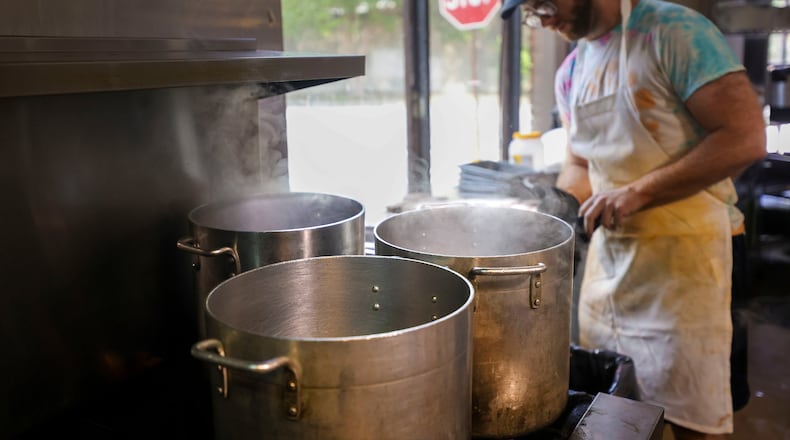Atlanta’s multi-day water fiasco was ripe with chaos and confusion from the start. As the Watershed Management Department tried to stop geyser eruptions, the mayor’s whereabouts were unknown, the city’s communications team was on radio silence and the only thing residents, businesses and visitors had to go by was a map of the impact area that was as detailed as a kindergarten crayon drawing.
Folks have been outspokenly critical of the city’s response to the water crisis. But rapid mobilization by affected restaurants in Little Five Points, Downtown, Grant Park, Old Fourth Ward, the West End, East Atlanta, Midtown, Inman Park, Candler Park and other neighborhoods deserves an A grade.
Credit: AJC
Credit: AJC
When water outages and low pressure became apparent midmorning May 31, restaurants pivoted in a matter of hours, coming up with a Plan A, then B and sometimes C.
If Plan A meant closing for Friday dinner service, they used social media and eblasts to inform would-be customers and directly contacted those with reservations. With the water boil advisory still in effect and taps still dry or at a drip on Saturday, some restaurant operators and their teams devised workarounds.
Reid and Sophia Trapani of La Semilla in Reynoldstown opened for takeout. He adjusted the menu with dishes that required less water to prepare. They used gallons of prebatched agua fresca for margaritas lest it go to waste. Despite doing their best to turn lemons into spiked lemonade, they estimated their lost revenue at $20,000.
After closing Friday and Saturday, Kirkwood eatery Sun in my Belly couldn’t afford to lose an entire weekend of business. So, on Sunday, it was an all-hands approach to open safely with rented portable toilets, fresh ice and boiled water readied by cooks who arrived a couple hours earlier than their usual shift.
To make up for lost revenue and avoid pitching a weekend’s worth of food, Kitty Dare in Inman Park held a special event Monday — when the restaurant is normally closed and the staff off.
Fifth Group founder Steve Simon told me that the biggest challenge of the weekend water woes was the lack of communication from city leadership that left them “trying to figure out what was going on. I think that’s what everyone ran into. We didn’t know what to expect or when to expect it.”
The quick troubleshooting by restaurants amid chaos and confusion bears striking resemblance to the early days of the coronavirus pandemic. When a presidential order on March 13, 2020, declared the COVID-19 outbreak a national emergency, every restaurant was required to shut down its dining room.
Restaurants shifted to takeout, diversified their businesses with retail and added online ordering platforms to their websites. Once Georgia businesses were allowed to reopen with on-site service, they had to follow an arduous set of 39 guidelines, some ambiguous and open to interpretation.
Operators made decisions based on sometimes-conflicting information from public health experts and elected officials at the local, state and national levels.
When they sought financial relief through the Small Business Administration’s Paycheck Protection Program, small businesses were unclear about the process worked or whether their applications would be approved. Two weeks after the program launched, it began to run out of funds, and the SBA stopped accepting new applications. The PPP loan debacle ensued for months.
Millions of unemployed food service workers across the country found themselves standing in food pantry lines and dealing with eviction notices. Many abandoned the industry altogether, leading to a worker shortage that still exists today.
Then as now, restaurants deserve more than a pat on the back for handling a crisis as best they could. That’s not what pays the bills for owners. “Thank you” and “I’m sorry” doesn’t cut it for servers, cooks, bartenders, baristas, hosts, cashiers and other employees who depend on hourly wages and tips to feed themselves and their families.
What will be the response this time around?
Help appears to be coming for business owners. Atlanta Mayor Andre Dickens announced plans to establish a financial relief fund to help businesses that suffered losses during the outage. According to Atlanta City Council President Doug Shipman, “$5 million is the current number.”
“My hope is that within a few weeks there’ll be a very short application process and then Invest Atlanta will be administering those funds,” Shipman said Wednesday as a guest on the AJC’s “Politically Georgia” podcast.
Let’s hope the process isn’t PPP déjà vu.
But what is the lifeline for workers like Ayanna Fields, who juggles two food service jobs and whose shifts were canceled at both of her places of employment last weekend? Or Kavonda Byrd, a server at Sun in My Belly who makes $2.13 in hourly wages and estimated she lost more than $200 in tips, about a third of her weekly income?
“Most of us wait for the weekend, because that’s when we make all our money,” Byrd told the AJC. “That was a major blow.”
It’s a sad reality that there are few safety nets for most food-service workers, the backbone of the food-service industry.
Several workers reached out to Giving Kitchen, an Atlanta-based nonprofit that helps food-service workers facing unexpected hardship.
“When you’re already in crisis, little additional things can pile up,” said Giving Kitchen founder Jen Hidinger-Kendrick. She said the organization fielded calls from workers needing rental and utility assistance because of lost income from the water outages.
She also encouraged the public to support restaurants during difficult times. “Please go visit them and tip extra, please be kind and full of gratitude to the staff who goes out of their way to serve us.”
Giving Kitchen and sympathetic diners are filling a gap that should be covered through public policy changes that would enable restaurant employees to go a week without a paycheck.
That was a COVID-19 lesson that elected officials have yet to take to heart.
Ligaya Figueras is the senior editor for food and dining and lead dining critic for The Atlanta Journal-Constitution.
About the Author
Keep Reading
The Latest
Featured





